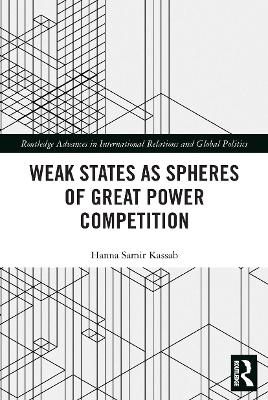
Weak States and Spheres of Great Power Competition
Seiten
2022
Routledge (Verlag)
978-0-367-50583-7 (ISBN)
Routledge (Verlag)
978-0-367-50583-7 (ISBN)
This book explains the development of the international system’s present-day balance of power by exploring three central questions: (1) under what conditions has the international system order evolved from a unipolar system to the current multipolar system? 2) What are its major states? 3) How do weak powers affect great power competition?
This book explains the development of the international system’s present-day balance of power by exploring three central questions: (1) Under what conditions has the international system order evolved from a unipolar system to the current multipolar system? (2) What are its major states? (3) How do weak powers affect great power competition?
It puts forward the following hypotheses: (1) if China and Russia are expanding their military, political, and economic influence into weaker states globally, then the unipolar American order is unraveling; and (2) if the international system is multipolar, then great power balancing may enhance international security. However, balancing may be made difficult because of weak state aid-seeking behavior. When weak states engage competing great powers, they become spheres of competition. This book delves into these states. Whether in Africa, Latin America, the Middle East, Central Asia, East Asia, or Eastern Europe, great powers hope to establish some control over weaker units for security, economic, and at times, prestige purposes.
This book will be of interest to students and scholars of political science and IR, security studies, and IPE, as well as members of the think tank community and policy analysts.
This book explains the development of the international system’s present-day balance of power by exploring three central questions: (1) Under what conditions has the international system order evolved from a unipolar system to the current multipolar system? (2) What are its major states? (3) How do weak powers affect great power competition?
It puts forward the following hypotheses: (1) if China and Russia are expanding their military, political, and economic influence into weaker states globally, then the unipolar American order is unraveling; and (2) if the international system is multipolar, then great power balancing may enhance international security. However, balancing may be made difficult because of weak state aid-seeking behavior. When weak states engage competing great powers, they become spheres of competition. This book delves into these states. Whether in Africa, Latin America, the Middle East, Central Asia, East Asia, or Eastern Europe, great powers hope to establish some control over weaker units for security, economic, and at times, prestige purposes.
This book will be of interest to students and scholars of political science and IR, security studies, and IPE, as well as members of the think tank community and policy analysts.
Hanna Samir Kassab is a Teaching Assistant Professor in the Political Science Department at East Carolina University, USA.
1. Introduction Part I: Great Powers and the Balance of Power 2. The United States and its Unipolar Moment 3. Eastern European 4. East Asia 5. Middle East Part II: Weaker states and Non-state Actors: Spheres of Great Power Competition 6. Latin America 7. Africa 8. Other Spheres of Competition and Global non-state issues 9. Conclusions
| Erscheinungsdatum | 22.04.2022 |
|---|---|
| Reihe/Serie | Routledge Advances in International Relations and Global Politics |
| Zusatzinfo | 5 Tables, black and white; 2 Line drawings, black and white; 2 Illustrations, black and white |
| Verlagsort | London |
| Sprache | englisch |
| Maße | 156 x 234 mm |
| Gewicht | 453 g |
| Themenwelt | Sozialwissenschaften ► Politik / Verwaltung ► Europäische / Internationale Politik |
| ISBN-10 | 0-367-50583-5 / 0367505835 |
| ISBN-13 | 978-0-367-50583-7 / 9780367505837 |
| Zustand | Neuware |
| Haben Sie eine Frage zum Produkt? |
Mehr entdecken
aus dem Bereich
aus dem Bereich
Studienbuch
Buch | Hardcover (2023)
De Gruyter Oldenbourg (Verlag)
CHF 62,90
erfolgreiche Interessenvertretung durch Prozesskompetenz im komplexen …
Buch | Hardcover (2023)
Wiley-VCH (Verlag)
CHF 58,75


